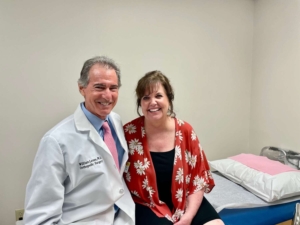What’s Your Knee Replacement IQ?
(First of a three-part series)
If you’re like many other people who are considering scheduling knee replacement surgery, you may have so many questions that your head feels like it’s spinning. What happens during the surgery? How long will I be out of commission? Am I going to be in excruciating pain? Will I ever again be able to dance or play the sports that I love?
At The Leone Center for Orthopedic Care at Holy Cross Health in Fort Lauderdale, our experience has repeatedly taught us that well-informed patients have an easier time recuperating from their surgery and resuming their full activities faster than those who haven’t taken the time to ask questions, get the answers and put their minds at ease.
We are a concierge practice dedicated to providing an exceptional level of personalized, attentive care, beginning with the first phone call and continuing through the entire surgical experience. Dr. Leone is a renowned surgeon with an extraordinary support team and a state-of-the-art surgical facility.
Our personalized approach begins with the first phone call and continues throughout your care. No crowded waiting rooms or rushed meeting with Dr. Leone, who personally spends time explaining your diagnosis, the best treatment for your condition and if surgery is indicated what it entails and the rehabilitation process after.
You will receive a helpful booklet (downloadable from The Leone Center website) filled with step-by-step information.

What you should know
The series (three) includes a total of 20 TRUE or FALSE questions. Expanded answers are provided for each question at the end of each “quiz”. This first series includes 7 questions which have been written to test your knowledge, inform, and help educate you about total knee replacements. They are also written to hopefully boost your confidence. These are the same questions that many patients have asked over the years.
True or False?
- The most common reason to have a knee replaced is to relieve arthritic knee pain.
- Physical therapy can delay, but not prevent the need for a knee replacement.
- Older adults who are healthy and physically fit are not too old to have a knee replacement simply by virtue of their age.
- Osteoarthritis always occurs as we get older.
- There is no cure for osteoarthritis, but there are ways to manage the pain and progression of the disease.
- People over 65 should not expect to ever recover from knee replacement fully.
- With the modern techniques used by anesthesiologists, including shorter-acting and more specific medicines, regional anesthesia and blocks, the complications people used to experience after anesthesia are being avoided.
Answers:
(1-7) True, True, True, False, True, False, True
- TRUE: The most common reason to have a knee joint replaced is to relieve arthritic knee pain.
Knee arthritis is by far the most common reason why knees are replaced. A knee is said to be “arthritic” when the cartilage that covers the bones that make up our knees is no longer present, so that when the knee moves the bones rub together resulting in pain, inflammation and swelling. There are numerous reasons why natural cartilage is no longer present or compromised. Replacing an arthritic knee is a very predictable way of relieving pain. When pain resolves, range of motion and function typically improve because the joint no longer hurts.
- TRUE: Physical therapy can delay, but not prevent the need for a knee replacement.
The goal when treating an osteoarthritic knee is to slow down the progression and minimize symptoms with non-surgical treatments, which include physical therapy until “conservative treatments” are not effective. Then joint replacement may be appropriate. Patients who go into surgery more fit and with stronger muscles get well faster than patients who are not. Whatever exercise you can do before surgery that strengthens your muscles and improves your fitness will benefit you, making your surgery safer and your recovery easier.
Many times physical therapy can decrease symptoms from an arthritic knee joint, at least temporarily and in an early stage, by improving knee flexibility and strengthening the muscles that move our knee.
Physical therapy is an important and appropriate treatment for knee arthritis, especially in the early stages and is part of “conservative management”. Unfortunately, physical therapy does not stop the progression of joint destruction or reverse it. If someone presents with advanced knee arthritis with deformity, then physical therapy can sometimes make this condition worse causing more pain. If physical therapy is making the condition more painful, then stop the physical therapy.
“Preparing for Your Knee Replacement” is a booklet that outlines a number of exercises that you should do before your surgery and can be downloaded from the Leone Center website.
- TRUE: No one is too old to have a knee replacement.
Dr. Leone has cared for many patients who delayed or decided not to have a knee replacement surgery because they thought they were too old or were told they were too old. Age is not a contraindication, but rather a consideration and another important variable that must be respected when caring for an older patient. Older folks heal just as predictably as younger folks, although it sometimes takes a little longer.
It is important for anyone who is contemplating knee replacement surgery to be thoroughly evaluated before their surgery. All medical conditions or problems must be defined, optimized and then managed. What Dr. Leone often finds is that when this occurs and any modifiable risk factors are addressed, such as better control of one’s diabetes or hypertension, cessation of smoking, or losing weight, that surgery can proceed safely. Caring for some people is more difficult and even riskier than caring for others. This is almost never due to one’s age but rather their medical conditions or the specific issues with their knee that necessitate surgery.
“It has been relatively rare in my experience that someone cannot proceed with surgery because of an underlying medical condition after it has been optimized” says Dr. Leone. Patients should never be told they can’t have surgery solely because they are older.
- False: Osteoarthritis always occurs as we get older.
This is kind of a trick question. Osteoarthritis is the most common type of arthritis, as well as the most common diagnosis leading to knee replacement. It is also true that osteoarthritis is more common in older folks compared with younger ones, but not everyone who is lucky enough to enjoy old age will develop osteoarthritis. Like many things in life, multiple factors are involved.
- TRUE: There is no cure for osteoarthritis, but there are ways to manage the pain.
Osteoarthritis results in a progressive destruction of the specialized hyaline cartilage covering the bones that comprise our knee. It helps to remove friction as the bones move against each other, acts as a shock absorber and distribute knee joint forces. Unfortunately, hyaline cartilage does not heal, so when it is injured, it progressively deteriorates, resulting in bony destruction, swelling and deformity.
The goal when treating an osteoarthritic knee is to slow the process down and minimize symptoms with nonsurgical treatments. Knee replacement (partial or total knee) may then become appropriate when nonsurgical “conservative treatments” are no longer effective.
- FALSE: People over 65 should not expect to ever fully recover from a knee replacement.
This is a silly statement! We’ve all heard the cliche that age is just a number. Well, when it comes to surgery, truly it is not how chronologically old someone is, but rather how physiologically young they are. Dr. Leone cares for folks well into their 90s and some are healthier than others in their 60s.
So, of course people who have their surgery when they’re 65 years old and much older can have wonderful and complete recoveries. What is important is optimizing whatever conditions they might have before their surgery, which makes surgery safer and their recovery safer and easier.
Dr. Leone emphasizes to his patients that whatever they need to do before their surgery, such as lose weight, stop smoking, get better control their diabetes or hypertension is for them. Optimizing any modifiable risk factors ahead of time hopefully will lead to a longer, more active and fulfilled life, as well as a safer surgery and faster recovery.
- TRUE: With the modern techniques used by The Leone Center anesthesiologists, including shorter-acting and more specific medicines, regional anesthesia and blocks, the complications people used to experience after anesthesia thankfully are being avoided.
Procedures done at the Leone Center for Orthopedic Care are shorter and more predictable with less blood loss and soft tissue trauma than ever before. Less anesthesia is required combined with shorter-acting agents and more regional blocks and spinals. This helps explain why nearly everyone walks just hours after surgery and so many people go home the day of their surgery. It’s really good care.
The Leone Center for Orthopedic Care provides highly personalized, end-to-end orthopedic care for people with hip and knee conditions. Dr. William Leone offers patients the latest, most-promising innovations in joint replacement surgery, in a compassionate, patient-focused setting. He has performed over 13,000 joint surgeries over the course of his career, restoring mobility and improving quality of life for thousands of patients from all over the world.
Check out Dr. Leone’s Patient Testimonials. These grateful patients make it all worthwhile.

The Leone Center for Orthopedic Care at Holy Cross Hospital is located at 1000 NE 56th Street in Fort Lauderdale. For more information or to schedule a consultation, please call 954-489-4575 or visit holycrossleonecenter.com.




